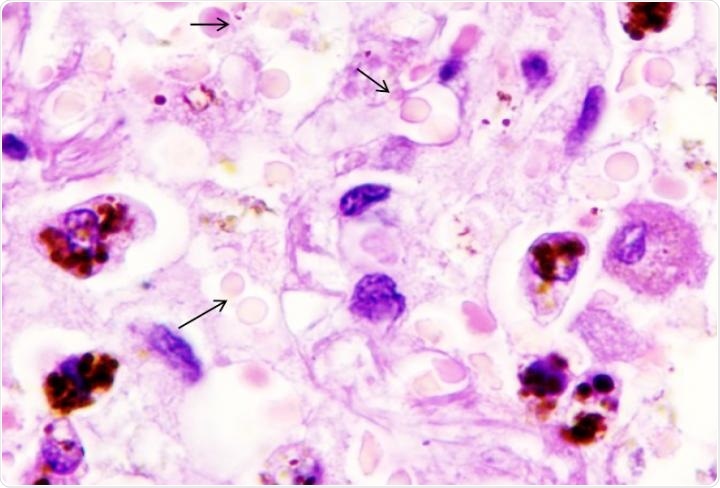Experts from the Department of Fundamental Medicine of Far Eastern Federal University (FEFU) with Japanese and Russian collaborators have investigated the mechanisms of COVID-19 inside-the-body distribution related to the damage of erythrocytes.

Lung parenchyma of patient 56 years old; Staining with hematoxylin and eosin. Microphoto ×400. Spherocytes, microcytes, and hypo- and hyperchromic erythrocytes are identified. Image Credit: Far Eastern Federal University press office.
According to scientists, the virus may attack red marrow, which is therefore detrimental for both erythrocytes in the bloodstream and also for the process of the development of the new ones. A similar article appeared in the Archiv EuroMedica journal.
Erythrocytes are the main target for the novel coronavirus, or SARS-CoV-2. The role of these red blood cells in the body is to transport the iron-rich protein hemoglobin that carries the oxygen.
The loss of erythrocytes may impair the brain neurons, internals, and blood vessels, considering that they do not get a sufficient amount of oxygen. Multiple organ failure may also occur in the most severe cases, and without their own red blood cells, patients begin to suffocate.
Artificial ventilation does not help much, because there is no means to transport oxygen inside the body. For such patients, an effective treatment is to administer vitamin B12 and erythrocyte mass. However, the mechanism of recovery of the impaired red blood cells continues to be an enigma for investigators.
The early disintegration of red blood cells is the body’s initial response to the SARS COV-2 virus, which increases slowly. The patient can gain a better understanding of the pathology by sensing the taste of iron. That happens because hemoglobin discharged from erythrocytes in the bloodstream enters the saliva.
The researchers believe that everyone who has low hemoglobin levels is at risk. Most importantly, these include aged people, patients with elevated blood pressure patients, pregnant women, people with diabetes mellitus and obesity, HIV- and cancer patients, and patients with primary and acquired immunodeficiency, with suppression of hematopoietic functions.
The virus enters the epithelium, where multiplies, then enters the bloodstream and attacks targets, which can be both the internal epithelium (gastrointestinal tract, lungs, genitourinary system) and erythrocytes.”
Galina Reva, Professor, Department of Fundamental Medicine, School of Biomedicine, Far Eastern Federal University
Professor Reva added, “Although most frequently we would see the pathology of the respiratory system, lungs, the virus needs epithelial cells only for reproduction. We believe the main target for the virus is the red marrow, where it damages the endothelium, the tissue, which normally regulates the migration of maturing cells into the blood.”
“For this reason, strange things happen to the cells of the immune system, and megakaryocytes, very large cells of the bone marrow, had been found in the tissues of various organs. Normally, megakaryocytes become sources of platelets, which are responsible for blood coagulation, but with COVID-19 they clot blood in the vessels without any necessity,” added Professor Reva.
Professor Reva further added that lung fibrosis is the most evident manifestation of COVID-19, which occurs as a usual formation of scar tissue in the area of defect.
Since fibrosis is caused by megakaryocytes “thrown” into the bloodstream, analogous processes may take place in the tissues of all parenchymal, or dense, organs, such as the liver, lungs, spleen, pancreas, kidneys, and thyroid.
This is an aggressive process, though it can be slow and relatively benignant, with no clinical manifestations at the background of anemia, short wind, and increased heart rate. Simultaneously, the number of functionally active cells of organs' tissue is shrinking, stromal elements that perform as a soft framework increase.”
Galina Reva, Professor, Department of Fundamental Medicine, School of Biomedicine, Far Eastern Federal University
Reva continued, “Sometimes local changes take the form of a large fibrous tumor-like formation. The pathology is very dangerous since clinical signs can appear when these irreversible processes occupy a significant volume of the organ.”
To develop targeted measures and treatment to prevent potential complications after coronavirus 2, the mechanism behind fibrosis of the lungs tissue, kidneys, liver, and other organs should be examined.
According to Professor Reva, coronavirus 2 also causes the destruction of white pulp found in the spleen, the very tissue that produces cells responsible for causing infectious immunity, like B-lymphocytes and T-cells. For this precise reason, secondary infections comorbid to coronavirus 2 are fatal to human beings.
The body simply has nothing to defend. A patient can live only through huge doses of antibiotics, when the crucial thing is not to be delay. This is because when the red cells start to die from oxygen shortage, individuals start to suffocate and to save them is even harder.
At the subsequent phase, investigators have planned to check the intercellular interactions and connections to go down the chain of the virus's means of action to the end. Once they achieve that, they hope to interpret which cells in the body had to be activated in a severe course of the disease, and why it is simply impractical to try to influence.
Performing the research work, investigators examined the outcomes of their own analyses of lung samples taken from 79 patients who died from COVID-19 disease, which was confirmed by PCR. In the control group, 14 patients died unexpectedly.
Source:
Journal reference:
Reva, I., et al. (2020) Erythrocytes as a Target of SARS CoV-2 in Pathogenesis of Covid-19. Archiv EuroMedica. https://www.scienceopen.com/document?vid=d38fcee4-b73e-474f-b11a-0607d2cb0228